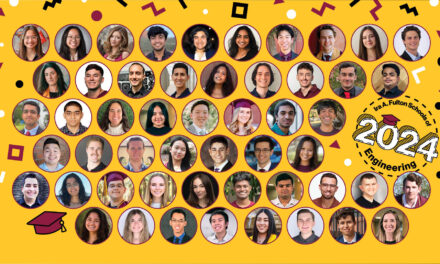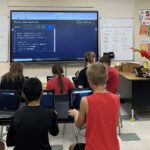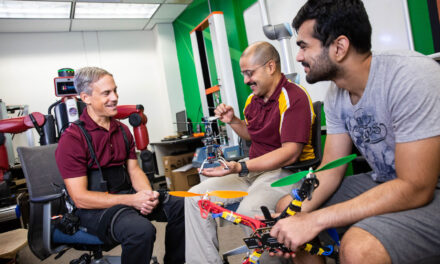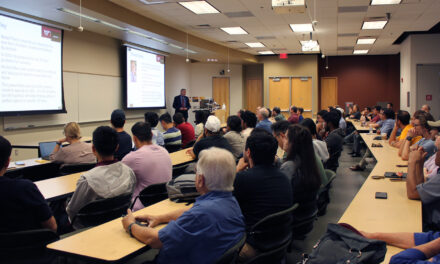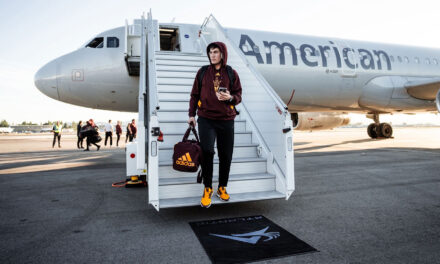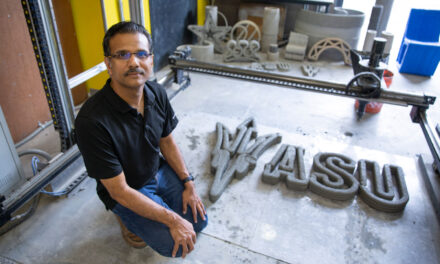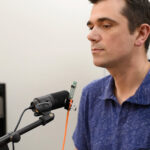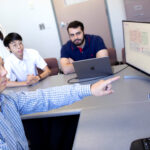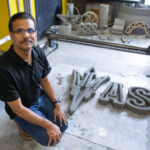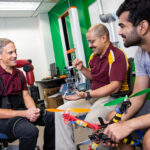
Connecting the coding community
CodeDevils serves online students as one of ASU’s first online-focused student organizations

Navigating the college experience online can be challenging — something many of us got a taste of as a result of the pandemic. It can be difficult to build relationships the same way you would by attending classes on campus.
CodeDevils is working to bridge the gap at Arizona State University as one of the university’s first online-only student organizations, building a sense of community among both in-person and online students through coding projects and networking opportunities with industry experts.
Founded in 2016, the organization affords its nearly 2,200 registered members flexibility with study halls, club meetings, coding projects, networking opportunities with CodeDevils alumni and hackathon competitions. All opportunities are held virtually, with students connecting on several platforms including Discord and Slack channels.
According to Ruben Acuna, CodeDevils’ faculty advisor and a teaching assistant professor for software engineering in the School of Computing and Augmented Intelligence, part of the Ira A. Fulton Schools of Engineering, the organization gives students opportunities to build their skills in addition to a supportive community.
“CodeDevils manages several ongoing programming projects that are open to students who are interested in practicing their skills and experiencing working in a group setting on an applied project,” he says. “The projects are often mentored by alumni, giving students exposure to real-world practices and helping distinguish their resumes.”
Full Circle talked with CodeDevils student officers — President Rhett Harrison, Vice President Navya Gangrade and Treasurer Jordan Yee — to learn more about what it’s like to be part of the organization.
Harrison is an ASU Online senior majoring in software engineering and works full-time as a software developer. Gangrade is a junior and Yee is a sophomore, both majoring in computer science. They all say that their involvement in CodeDevils has helped shape their college experiences, building friendships and making connections without relying on in-person opportunities.
What is it like to be a member of an online-based student organization?
Rhett Harrison: Wherever you can access the internet you can be part of this organization. It’s great to help build relationships with people from all over the world. If a member over in the United Kingdom wanted to get a job in the United States, they could make connections here and vice versa.
Navya Gangrade: It’s really convenient because everything is online and over Zoom. Our meetings are recorded too, so even if you miss one you can still find out what’s happening and stay up to date. Our main form of communication is over Slack, which makes it easier for everyone to be in the same community. If you’re working on a project and you don’t understand something, you have immediate access to everyone online. You can still be part of something from home, which is great for in-person students who commute and can’t always be on campus.
What was the reason behind starting a virtual student organization?
NG: There wasn’t another programming-based organization at ASU, so the previous president and student officers wanted to make it easier for online students to have something to get involved in. With this option online, there is no need to commute or be on campus, so that opens it up to so many more students who may be remote or in another state or part of the world.
Jordan Yee: The whole reason it’s an online organization is because it was built with an emphasis on creating opportunities for students to get involved from wherever they are.
What kind of coding projects do you work on?
RH: We have three projects that are going on right now through the React Component Library. Essentially what we’re doing is using a JavaScript framework called React and building website Legos. They’re reusable bits of code that can be put anywhere on a website and customized to your liking. Instead of going through and repeating your code, this can be reused and has all the code with it already. Another one of our projects is a URL shortener and redirection tool that uses another web framework similar to React called Angular.
JY: Another project we’ve been working on for a while is called DevilBot. It’s like a SlackBot or DiscordBot written in Rust. It will interact with you in the chat and you can add on any other features you may want as well, like sending reminders and giving group updates. The project is led by a CodeDevils alumnus who currently works at Google so that gives a great opportunity for students to interact with an industry expert and ask questions. Because it’s an ongoing project, there are always functionalities that new and existing members can work on.
How has CodeDevils helped enhance your student experience?
RH: CodeDevils gave me the skills I needed to get my first job in software engineering. I worked on my interview skills and used connections as references, so I was able to show off the projects I’ve worked on. Our coding challenges helped me to prepare me for my technical interviews as a software engineer.
NG: It has definitely helped me grow on the coding side. Some of the languages we code in for our projects are not being taught in class, so CodeDevils offers steps to help students learn how to code and expand their knowledge of programming languages.
JY: For me, the networking aspect has been a big factor in being able to meet and interact with people like our alumni members. Being a sophomore, I’m always looking for future career pathways like internships so that’s a huge benefit of CodeDevils.






